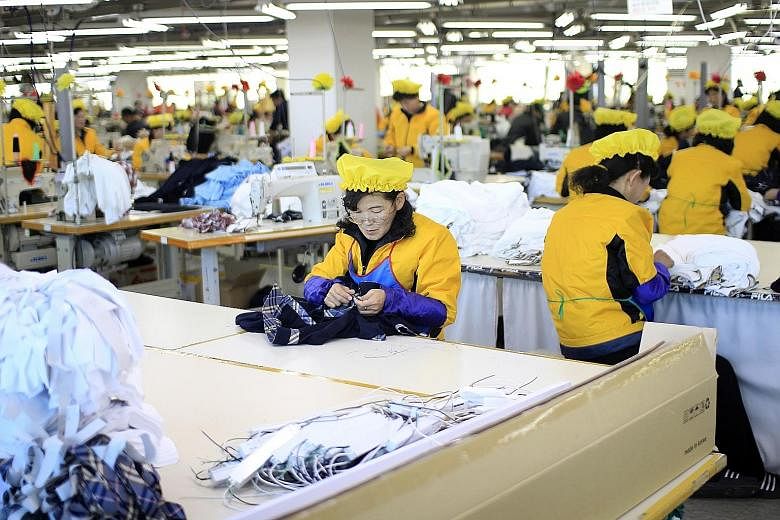When the new school year starts today, tens of thousands of students may have to turn up in casual clothes.
That is because uniforms are in short supply after manufacturers based at the inter-Korean Kaesong Industrial Complex (KIC) in North Korea were forced to abandon their stocks when it was abruptly closed early last month.
The shutdown, ordered by Seoul in protest against Pyongyang's nuclear and missile tests, could cost 124 South Korean companies more than 815 billion won (S$928 million). Forty-nine firms are solely based in the industrial park, just across the demilitarised zone.
The companies are demanding compensation and want to get back in as soon as possible but analysts expect the complex to remain closed for months.
"Once just and fair compensation has been given, our next goal is to re-enter Kaesong Industrial Complex and restart our businesses," said garment factory owner Jeong Gi Seob, who is chairman of the Corporate Association of Kaesong Industrial Complex.
Mr Jeong's company, SNG Fashion, hires 940 North Korean workers and nine South Korean supervisors. His factory is a supplier for Hyungji Elite, which provides uniforms to 679 schools.
He said more than 100,000 pieces of clothing were left behind when his factory was notified just two hours ahead of the public announcement of Kaesong's closure on Feb 10. Three other school uniform manufacturers had to abandon their goods as well, he said.
The shutdown marked the end of the only economic cooperation between the two Koreas. The complex, which began as a symbol of reconciliation, was closed for five months in 2013 due to cross-border tension. This time, analysts expect the shutdown to last longer amid Seoul's hardline approach and harsher economic sanctions proposed by the United Nations.
Seoul believes 70 per cent of the investment made in Kaesong was diverted to fund Pyongyang's nuclear programme. About 1 trillion won, including 616 billion won in cash, has been invested by the South Korean government and companies since the opening of the joint industrial complex in 2004, according to the Unification Ministry.
Dr Bong Young Shik, from the Asan Institute for Policy Studies, said the prospects of the KIC reopening are dim, and North Korea may convert the facility back to the military base it was previously.
Ewha Womans University international relations professor Park Ihn Hwi said he supports the government's decision to close Kaesong and does not expect it to reopen within the year. Seoul has done all it can to peacefully engage North Korea, he said, even if the move came at the expense of South Korean companies based there.
"It's not that we disregard the damages the companies suffered, but it's not very critical considering that they have made a lot of money operating in Kaesong for the past few years," he added.
The South Korean government offered incentives and subsidies to lure small and medium-sized companies to set up base in Kaesong, which is a private venture run by Hyundai Asan - part of the Hyundai Group - and Korea Land Corp. The firms there hire about 54,000 North Korean workers who earn a minimum wage of US$73.87 (S$100) a month making products such as clothing and textiles, car parts and utensils.
Up to 80 per cent of the businesses are profitable, said Mr Jeong, but the appeal to reopen Kaesong is less about making money and more about effecting change in North Korea. "The (KIC) has the positive effect of giving North Korean people a glimpse of life outside their country. It made them realise the true meaning of hard work and that made a big difference," he said.
Seoul announced last week it will offer low-interest loans worth 550 billion won to Kaesong firms but that is not enough, said Mr Jeong. Losses include fixed assets worth 560 billion won, he said.
North Korea has expelled all 800 South Korean workers and frozen all assets in Kaesong, which produced a record-high output of over US$500 million worth of goods last year.

